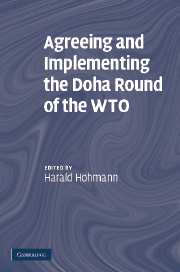Book contents
- Frontmatter
- Contents
- List of Contributors
- Foreword
- Introduction
- The future of the Doha Round
- PART ONE Development policy of the WTO
- PART TWO Trade policy (including competition) and trade facilitation
- 6a Trade policy objectives in the Doha Round – A European Union perspective
- 6b The final phase of the Doha Round
- 7 Further liberalisation of trade in chemicals – can the DDA deliver? A summary of the chemical industry's position on the Doha Development Agenda
- 8 Trade facilitation within the Doha Round: A critical review of recent efforts of the WTO and other international organizations (1996–2006)
- 9 ICN accompanied convergence, instead of WTO imposed harmonization, of competition laws
- 10 Legal principle of integration in the Doha Round: Embedding a social order in the global market
- PART THREE Reform of the dispute settlement system
- PART FOUR Social rights, health, and environment
- PART FIVE Conclusions
- Index
10 - Legal principle of integration in the Doha Round: Embedding a social order in the global market
from PART TWO - Trade policy (including competition) and trade facilitation
Published online by Cambridge University Press: 23 February 2010
- Frontmatter
- Contents
- List of Contributors
- Foreword
- Introduction
- The future of the Doha Round
- PART ONE Development policy of the WTO
- PART TWO Trade policy (including competition) and trade facilitation
- 6a Trade policy objectives in the Doha Round – A European Union perspective
- 6b The final phase of the Doha Round
- 7 Further liberalisation of trade in chemicals – can the DDA deliver? A summary of the chemical industry's position on the Doha Development Agenda
- 8 Trade facilitation within the Doha Round: A critical review of recent efforts of the WTO and other international organizations (1996–2006)
- 9 ICN accompanied convergence, instead of WTO imposed harmonization, of competition laws
- 10 Legal principle of integration in the Doha Round: Embedding a social order in the global market
- PART THREE Reform of the dispute settlement system
- PART FOUR Social rights, health, and environment
- PART FIVE Conclusions
- Index
Summary
The stone age Capaukoos – a Papuan people in former Netherlands New Guinea – were smart enough to fully understand the principle of one good turn deserves another. When Dutch missionaries stopped in the middle of the last century to reward the Sunday church attendance with cigarettes, the Capaukoos simply stopped coming: “No tobacco, no hallelujah.” The same mercantile spirit moved the ministers from Australia, Brazil, the European Union, India, Japan and the United States when they let the Doha Negotiation Round wreck: “No development round, no market access round.” WTO Director-General Pascal Lamy sighed at his press conference: “We have missed a very important opportunity to show that multilateralism works.” His frustration was shared at the time by member's comments blaming the inadequacy of proposals to cut in domestic support in agriculture. By accident, the WTO almost simultaneously launched the 2006 World Trade Report “Exploring the links between subsidies, trade and WTO.” According to the Report, government subsidies can be useful instruments in correcting market failures and working towards social objectives but can also distort trade and provoke strong responses from trading partners. In so doing, it left no doubt that “[F]rom an economic perspective, it is far from obvious that agriculture subsidies in rich countries are any more defensible than subsidies on manufactures in developing countries. The different treatment is therefore probably most easily understood in terms of asymmetries in negotiating power (…). A ray of hope, however, is an increasing attention in international trade law for human rights and for sustainable development in the global market.
- Type
- Chapter
- Information
- Agreeing and Implementing the Doha Round of the WTO , pp. 235 - 258Publisher: Cambridge University PressPrint publication year: 2008



